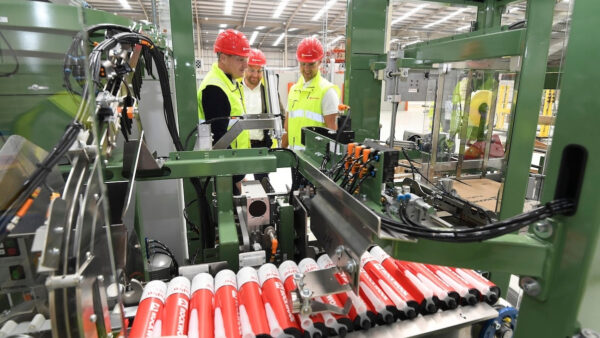
As the country marks National Apprenticeship Week, Michelle Essen and Sarah Wales discuss why the construction sector needs to futureproof its workforce.
Apprenticeships help construction companies bring in new talent, but they are also vital in tackling an industry-wide and widely-recognised skills gap.

While it’s important the next generation is aware of career opportunities that exist within the construction sector, it is equally important that companies get to the heart of the challenges causing skills shortages across the UK.
The industry was quick to adapt to the challenges of 2020 but continues to struggle with labour and skill levels due to Brexit and the new immigration system. Going forward that means we are likely to see a reduction in the number of available EU national workers which the industry has traditionally relied upon.
The UK also has an increasingly aging population – this is mirrored in the construction workforce and will also have an impact on available labour and skill levels in the longer term.
It is clear that increased labour and skills shortages can affect the ability of companies to deliver projects on time or take on new work and can result in the cost of labour going up. So, what steps can employers and contractors take to mitigate the risks?
Look to youth
Office of National Statistics figures in October 2019 showed there were 334,332 skilled construction and building trade workers aged between 50 and 64 and 44,681 over 65 in the UK – most will potentially retire over the next 15 years.
Meanwhile, the industry is struggling to attract young people. In 2018 it was reported that construction had, for the first time, dropped out of the top 10 career choices for people aged 22-29.
Getting young people to understand what construction careers are about is a vital step in reducing the skills and labour shortage, and therefore needs to be a high priority for the industry. More needs to be done to educate pupils – and their parents and teachers – about what options are available and what a career in construction looks like. There is a strong business case for getting experienced construction workers into schools to inspire the workers of tomorrow.
Construction firms can also take advantage of government incentive payments for the hiring of new apprentices, but they will need to act quickly as this scheme only applies to apprentices hired before 31 March 2021.
The Midas Group is one construction company using apprenticeships to support social mobility and widen routes into the industry.
Midas has long recognised the contribution apprentices make to the success of the group and the industry as a whole and home-grown talent has always been at the heart of Midas’ recruitment strategy, with the apprenticeship programme now firmly embedded within that strategy.
As part of this, Midas has developed its own comprehensive LAUNCH programme, which supports all its apprentices and graduates through their first year of employment and ensures a more effective group of new starters. The programme is proving successful in generating high engagement and retention levels and laying the foundations for successful careers within the industry.
Oliver Farmer is a trainee quantity surveyor for Mi-space, the group’s specialist residential business. He is studying for a degree apprenticeship funded by Midas’ Apprenticeship Levy and is one of the many success stories we see emerging from apprenticeship opportunities.
Oliver shared his experience, commenting: “I was attracted to the development opportunities of an apprenticeship, Midas’ trainee programme LAUNCH and the possibility of eventually working my way up to the role of site manager or project manager. My apprenticeship has been a win-win for me, getting hands-on experience while learning and earning.”

“The industry needs to show potential new workers what construction looks like today.”
Reflect on pandemic lessons
The post-pandemic rise in technology take-up has changed the way manual roles are carried out. For example, drones are used for 3D modelling, volume measurement and topographical surveys, and are predicted to fulfil an essential role in the future. As a result, this will require young people with a different skillset.
As the use of technology and other innovative methods of construction are increasing, including modular construction and BIM, construction jobs are not necessarily the low-tech, manual jobs that people stereotypically think they are. The industry needs to show potential new workers what construction looks like today, what the new opportunities are, and where there is space for them grow and to help develop the industry. This will allow students to adapt to shortages in a particular skill set. It is also important to promote the industry to students from STEM subjects, who would not typically consider a career in construction.
Embrace equality, diversity and inclusion
Women remain under-represented in construction: in Q2 2020, there were 1.9m men in the industry in the UK compared with 289,000 women.
The industry also under-employs BAME (black, Asian and minority ethnic) groups. Exact levels of BAME employment in construction vary according to different sources, though one report suggested around 7.4% of construction workers identified as BAME.
With the UK’s pool of talent more diverse than ever, it is more important than ever that companies make the shift towards diversifying their workforce now.
Brexit-proof your recruitment process
The new UK points-based immigration system kicked in on 1 January 2021 and increased bureaucracy, and lead times, around this system will create delays in the short-term. Companies should get their recruitment processes Brexit-compatible by understanding and implementing new visa criteria and processes and prepare to factor longer recruitment lead times into project planning.
Keep up to date on government guidance
It’s important to keep on top of the latest government guidance. Companies should encourage consistent use of personal protective equipment (PPE), and ensure their teams feel safe. This will encourage productivity and minimise absence due to sickness or injury and is likely to have a positive impact on staff retention in a competitive marketplace.
Michelle Essen is managing associate and Sarah Wales is associate at law firm Womble Bond Dickinson. This article is published in association with Womble Bond Dickinson.










